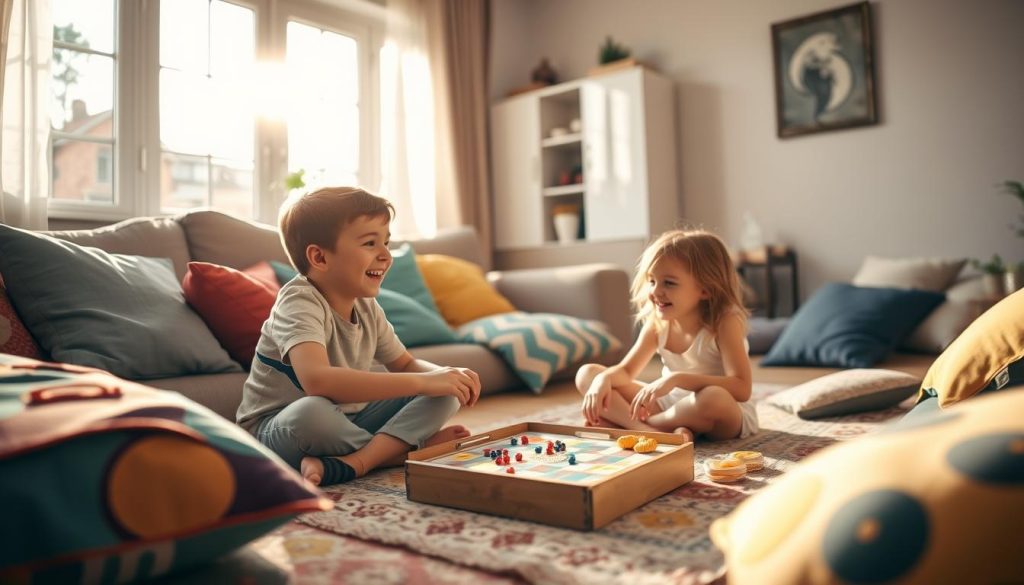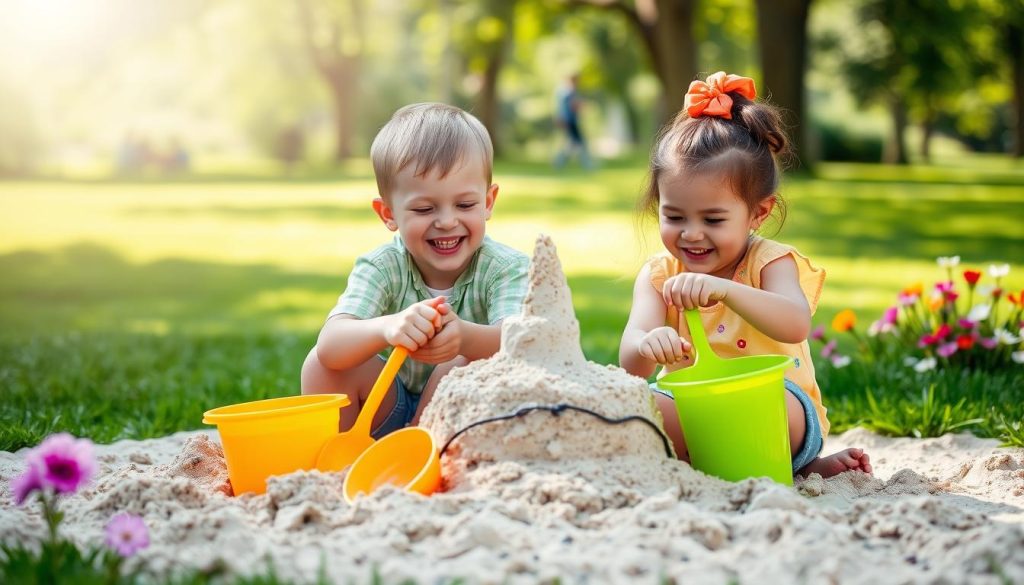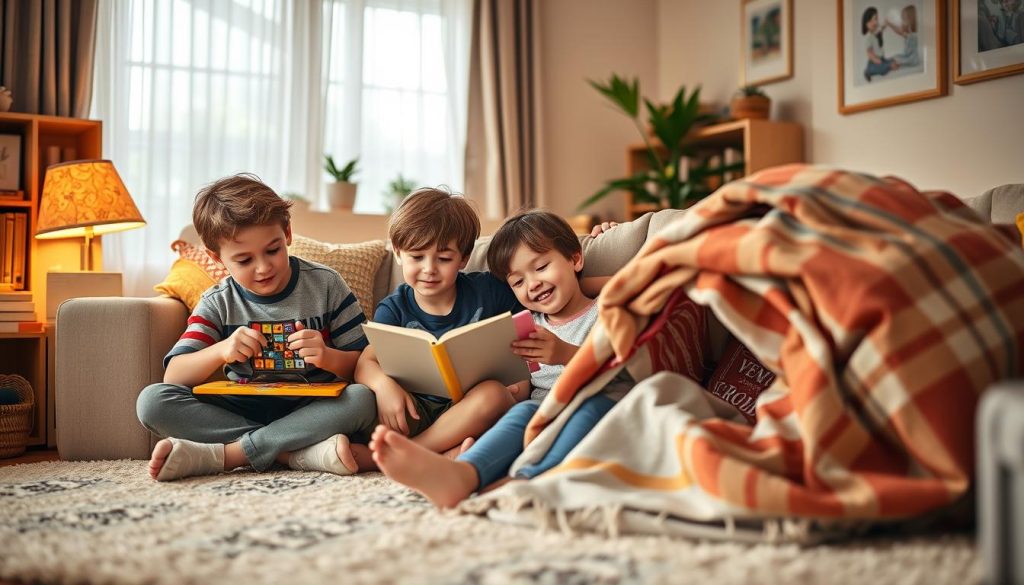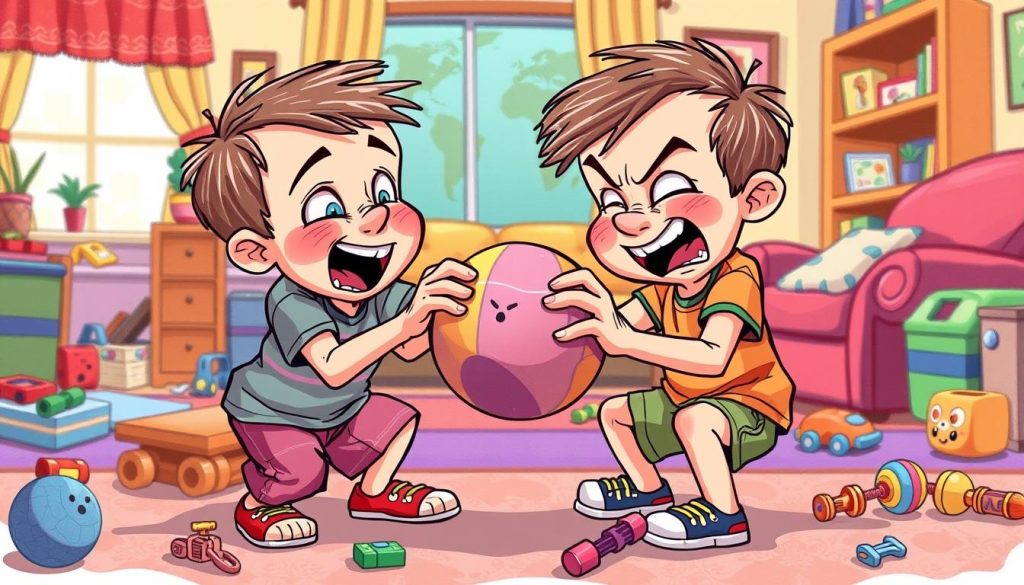
Growing up with siblings can be a wild ride. It’s filled with both special moments and tough times. As a parent, I’ve seen how sibling bonding activities can make siblings closer and create memories that last.
Imagine how your kids laugh and work together to enjoy their childhood. Seeing their excitement and sense of ownership was truly touching. It showed me how important these moments are for their bond.
Sibling bonding activities are key for families with multiple kids. They can be anything from working on a project together to playing outside. These activities help reduce fights, encourage teamwork, and strengthen their bond.
From most family’s experience, I’ve learned that focusing on sibling relationships is important. It helps create a more loving and supportive home for kids to grow in.
Key Takeaways
- Sibling bonding activities can help reduce conflicts and foster positive relationships among children.
- Cooperative games and activities that promote laughter and shared experiences are very good for sibling bonds.
- Encouraging older siblings to help and support younger ones can create a sense of unity.
- Being flexible and adaptable when doing activities with siblings is important to manage conflicts well.
- Setting aside time for sibling activities regularly can give them meaningful experiences and strengthen family ties.
Understanding the Impact of Healthy Sibling Relationships
Siblings are very important in our lives. They help us from when we are young to when we grow up. They give us support and help us learn important skills.
Having good relationships with siblings makes us feel safe and understood. It also helps us make memories that last a lifetime. These relationships help us grow and make better friends.
Developmental Benefits of Strong Sibling Bonds
Siblings teach us by being good examples and friends. They also challenge us, helping us grow smarter and feel emotions better. This helps us learn to talk well, understand others, and solve problems.
Being close to siblings helps us feel like we belong. It also helps us learn to control our feelings and figure out who we are. This prepares us for the world around us.
Long-term Effects on Emotional Well-being
Siblings are always there for us, giving us a special kind of support. Research shows that having good siblings helps us feel better emotionally. It makes us stronger and more confident.
But, if siblings fight a lot or don’t show love, it can hurt us. It can make us feel sad or have problems with our mental health later.
Role in Social Skill Development
Playing with siblings helps us learn how to get along with others. We learn to talk, solve problems, and understand others’ feelings. These skills help us make friends and deal with challenges.
Having positive relationships with siblings helps us succeed in the world. It gives us the tools we need to handle life’s ups and downs.

| Statistic | Significance |
|---|---|
| Siblings spend around 33% of their time together, with children with siblings spending about half of their discretionary time engaged with their siblings. | Highlights the significant time siblings spend together, underscoring the importance of these relationships in child development and emotional well-being. |
| Nearly 70% of parents demonstrate a preference for one child over another, which can lead to increased levels of depression, antisocial behavior, or substance use in non-favored siblings. | Emphasizes the need for parents to strive for fairness and equal attention to avoid negative impacts on sibling relationships and individual emotional well-being. |
| Healthy sibling relationships equip individuals with the tools of communication, empathy, and conflict resolution, aiding in navigating complex social dynamics. | Demonstrates the critical role of positive sibling bonds in developing essential social skills for long-term success and well-being. |
The Psychology Behind Sibling Dynamics
Sibling relationships are complex and deeply rooted in family psychology. Birth order, how parents treat them, and their personalities all matter. Knowing these factors helps improve sibling bonds and create a better family atmosphere.
Alfred Adler’s theory says birth order shapes a child’s personality and sibling relationships. First-born children might feel superior and want to lead. Middle children often try hard to get noticed. Parental differential treatment can make siblings feel jealous and resentful.
| Birth Order | Potential Impacts on Sibling Dynamics |
|---|---|
| First-born | Sense of superiority, desire for dominance |
| Middle | Compete for attention and recognition |
| Youngest | May feel overlooked or less capable |
Also, personality differences can cause fights and negative feelings. This can make it hard for siblings to get along and communicate well.

But, supportive sibling relationships can be good for kids. They help with making friends, being social, and feeling emotionally well. By understanding sibling dynamics, parents can help create a better family atmosphere. This benefits all their children’s growth and happiness.
Common Challenges in Sibling Relationships
Siblings often face special challenges like age gaps and rivalry. They might fight up to 8 times an hour. Knowing these issues helps parents support their kids’ bonds.
Age Gap Considerations
Age gaps change how siblings interact. Younger ones might look up to older ones. Older ones might feel too much responsibility.
Parents need to balance attention and support for each child. This helps avoid fights over things like toys or time.
Birth Order Impact
Birth order affects how siblings act and feel. Firstborns might be more bossy. Younger ones might be more laid-back.
Parents should see and celebrate each child’s special qualities. This helps them feel valued and unique.
Competition and Rivalry Issues
Sibling rivalry often comes from wanting attention and things. Kids might try to outdo each other, causing fights. Parents must manage these feelings to keep peace.
| Sibling Relationship Challenges | Strategies for Parents |
|---|---|
| Age Gap | Provide individualized attention and support, foster shared activities |
| Birth Order | Recognize and celebrate each child’s unique strengths, avoid comparisons |
| Competition and Rivalry | Encourage cooperation, implement fair rules and routines, praise positive interactions |

Parents can tackle these challenges with care and smart plans. This way, siblings can grow closer and support each other for life.
Creating a Supportive Family Environment
It’s important to make a positive family space for strong sibling relationships. As parents, we help make a place where each child feels important, heard, and supported. We do this by showing good ways to talk, solve problems, and handle feelings.
Talking openly is key. We should let our kids share their thoughts, feelings, and views. This helps them understand each other better and solve problems together. We should also celebrate what makes each child special, not compare them.
Doing things together helps siblings get closer. When they work as a team, they learn to face challenges, make compromises, and help each other. This builds a supportive home atmosphere.
The key to happy siblings is the family we build. By talking openly, celebrating each child’s uniqueness, and encouraging teamwork, we create a caring space. This helps our kids make strong, positive bonds with their siblings for life.
Sibling Bonding Activities for Different Age Groups
Building strong bonds between siblings is key for a child’s growth. To promote brother sister games and playful interactions, activities should match each age group’s needs. Parents can help siblings form lasting connections with the right mix of quality time and fun.
Activities for Toddlers and Preschoolers
Young siblings enjoy simple yet fun activities. Try “Funny Animal Walks” to encourage laughter and movement. Art projects, like making a collage or painting a mural, boost creativity and teamwork.
Games for School-Age Children
As kids get older, games can get more challenging. Scavenger hunts teach teamwork and problem-solving. Board games and puzzles offer chances for quality time and friendly competition.
Teen Bonding Ideas
Teens bond over shared interests. Host movie nights, cooking classes, or activities that match their hobbies. These playful interactions create lasting memories and understanding.
Parents can tailor activities for each age group to make all siblings feel included. Whether it’s toddlers exploring or teens bonding over interests, these moments are key to lifelong sibling ties.
Indoor Creative Activities for Siblings
Helping siblings bond is great for their relationship. Indoor family activities are full of chances for sibling crafts. They spark imagination and teach teamwork.
Creating art together is fun. Siblings can paint a big mural or make cool collages. Building with cups or blocks is also fun. It lets them be creative and work together.
For kids who love building, making paper airplanes or small structures is exciting. Painting on windows is a great way for them to show their art. These activities make them feel proud of what they create.
Playing games like Mad Libs or telling stories together is good for their literacy. It helps them talk more, solve problems, and learn social skills.
Even when it’s rainy or hard to go outside, there are lots of indoor family activities. They help siblings bond through creative crafts and fun times together. This makes their bond stronger and creates memories that last.
Outdoor Adventures and Team Building
Outdoor adventures and team-building activities are great for siblings. They help siblings bond and have fun together. These activities make families closer and teach teamwork.
Nature Exploration Activities
Hiking and scavenger hunts are fun for siblings. They learn to work together and enjoy nature. These activities also teach kids to care for the environment.
Sports and Physical Games
Sports and games like relay races are fun. They help siblings learn to work together and support each other. These games also teach kids to communicate and strategize.
| Outdoor Activity | Benefits | Participant Range |
|---|---|---|
| Philanthropic-themed Scavenger Hunt | Improves problem-solving and communication skills | 10 to over 5,000 participants |
| Catapult to Success | Enhances teamwork and collaboration | 16 to over 300 participants |
| Team Wellbeing – Employee Wellness Program | Reduces stress and promotes overall well-being | 8 to unlimited participants |
| Wheels Around the World | Fosters a sense of community and philanthropy | 8 to 200 participants |
Outdoor adventures and team-building activities are good for siblings. They help families stay healthy and happy. Siblings learn to appreciate each other and the world.
Collaborative Projects That Foster Connection
Getting siblings to work together can make their bond stronger. These projects teach them to communicate, compromise, and feel proud of their work. Activities like making a family time capsule or cooking a meal together help siblings feel closer.
Research shows that working together on projects teaches kids important skills. It also helps them make memories and feel more connected as a family. When siblings work towards a goal, they learn to value each other’s strengths and celebrate their wins. This teamwork helps them in many areas of life.
| Collaborative Activity | Key Benefits |
|---|---|
| Family Time Capsule | Preserves memories, fosters creativity, encourages teamwork |
| Shared Meal Preparation | Develops culinary skills, promotes communication, teaches organization |
| Gardening or Model Building | Nurtures patience, problem-solving, and a sense of shared pride |
Projects that involve siblings in teamwork help them grow closer and learn valuable skills. By encouraging teamwork, parents help their kids build strong relationships. These relationships will bring joy and support to their lives for many years.
Using Humor and Play to Strengthen Bonds
Family fun and playful sibling interactions make brothers and sisters closer. Doing things that make everyone laugh creates happy memories. It also helps reduce fights and makes everyone feel good about being together.
Funny Games and Activities
Playing “Funny Face Freeze” or making up silly stories together makes everyone laugh. These fun times help siblings feel more connected. Studies show kids who play together have stronger bonds than those who don’t.
Playful Learning Experiences
Learning can be fun with activities like science experiments or cooking. These experiences make siblings excited to explore and learn together. Games like “Name, Place, Animal, Thing” help kids think creatively and grow.
Personalized books for siblings make reading fun and strengthen their bond. Treasure hunts, indoors or outdoors, teach teamwork and creativity. Adding humor and play to their time together makes siblings closer. It creates a happy atmosphere of family fun, playful bonding, and laughter.
Managing Conflict and Teaching Resolution
Sibling relationships can sometimes be tough, with conflicts and disputes. But, these moments can be chances for growth and understanding. By teaching your kids conflict resolution for kids, you help them manage sibling dispute management and have peaceful sibling interactions.
Teaching open communication and listening is key. When conflicts happen, let kids calm down first. This helps prevent things from getting worse and teaches them to control their feelings.
At family meetings, let each child share their feelings with “I” statements. This helps everyone understand each other better.
| Conflict Resolution Strategies | Benefits |
|---|---|
| Cool-down periods | Allows emotions to settle before problem-solving |
| Family meetings with “I” statements | Promotes empathy and understanding between siblings |
| Collaborative problem-solving | Invites children into the process and encourages mutual solutions |
When helping siblings solve conflicts, don’t tell them what to do. Instead, let them work together to find solutions. This makes them feel more involved and helps them learn to solve problems together.
By teaching your kids these conflict resolution for kids skills, you turn sibling fights into chances for growth. They learn to communicate better and manage conflicts in the future.
The Role of Parents in Sibling Relationships
Parents are key in shaping sibling relationships. They can prevent feelings of favoritism by being fair. This helps siblings get along better.
Balancing Attention and Support
Give equal attention, affection, warmth, and care to all kids. Spending time alone with each child shows you value them. Don’t compare their achievements to avoid rivalry.
Intervention Strategies
When fights happen, use strategies that help solve problems. Teach kids how to talk and solve conflicts. Show them how to have good relationships.
Set clear rules and expect kids to support each other. This helps them deal with sibling issues and builds strong bonds.
Good parenting can greatly improve sibling relationships. By being fair and teaching kids to solve problems, you help them have positive relationships. This will help them throughout their lives.
Building Trust and Communication
Building trust and open talk between siblings is key for strong bonds. Regular “sibling check-ins” let kids share feelings safely. Trust-building games like “trust falls” help siblings understand and value each other more.
Teaching kids to listen well and keep secrets is important. This builds trust and helps siblings connect deeply. Adding trust games and talking skills to your family’s life makes everyone feel closer and happier.
Research shows 95% of families can get better at talking and trusting through therapy. Also, 82% of families say they feel closer and trust each other more after bonding activities. Games like the spoon game help 73% of families listen and talk better.
| Family Therapy Activity | Success Rate |
|---|---|
| Engaging in family crest building activities | 68% increase in positive connections |
| Eye contact practice | 89% enhancement in communication skills and supportiveness |
| Genograms | 77% success in addressing family issues |
| Mirroring exercises | 64% improvement in body language awareness and emotional understanding |
| Stand up-sit down activities | 70% success in encouraging truthful and open communication |
By talking openly and doing trust games, families can grow closer. They’ll talk better and feel more united. This makes a happy and supportive home for everyone.
Special Time and Bonding Rituals
Creating special sibling bonding time and family traditions can make brothers and sisters closer. Having regular “sibling dates” lets kids spend time together without parents. This builds friendship and shared memories.
Studies show that family rituals and traditions help during big changes, like divorce. They lead to better grades, health, and happier marriages. Activities like game nights or annual trips help siblings bond strongly.
| Positive Family Rituals | Benefits |
|---|---|
| Shared family dinners | Improved academic performance, moods, and decreased risk-taking behaviors |
| Collaborative projects and chores | Teach teamwork, responsibility, and problem-solving skills |
| Outdoor adventures | Promote physical wellness, teamwork, and shared experiences |
| Arts and crafts activities | Enhance creativity, fine motor skills, and self-expression |
Experts say to give siblings at least 15 minutes a day for “Special Time.” They can do things they both like, like telling stories or playing games. Doing fun things together, like laughing or singing, makes bonding better.
By focusing on family traditions and positive times, parents help siblings stay close. This builds a lifelong friendship and understanding. It makes their relationship strong and supportive.
Celebrating Individual Strengths and Differences
Siblings have to deal with many things in their relationship. It’s key to see and celebrate what makes each one special. This way, we help them respect and appreciate each other more.
Recognizing Unique Talents
Every sibling has their own special skills and interests. It’s great to let them show off what they’re good at. This could be art, school, or sports. When we celebrate their strengths, it makes them feel proud and helps them support each other.
Fostering Mutual Respect
Siblings sometimes disagree and fight. But teaching them to respect each other is important. This helps them understand and care for each other more.
Studies say 85% of adult siblings think celebrating their differences makes their bond stronger. By valuing each person’s uniqueness, we help them learn to get along better.
Every sibling is special in their own way. By embracing and celebrating these differences, we build strong bonds that last forever.
Technology and Modern Sibling Bonding
In today’s world, technology helps siblings bond, even if they live far apart. They can play online games together. This way, they can work as a team and feel like they’ve achieved something big.
Games that tell stories can also help siblings talk more. They can discuss right and wrong choices and how characters change.
Families can have virtual movie nights too. Siblings can watch movies together from different places. They can also work on social media projects to show their creativity.
Video calls are great for keeping in touch. They let siblings do things together, even if they’re not in the same place.
Apps and coding projects are also good for siblings. They help them learn and solve problems together. Technology helps siblings stay connected and share experiences in today’s world.
Conclusion
In conclusion, fostering healthy sibling relationships is essential for creating a nurturing family environment. A strong sibling connection can provide children with a sense of belonging, support, and companionship throughout their lives. However, disputes and conflicts can arise, challenging the harmony of these relationships. Recognizing the significance of this bond allows parents and caregivers to take intentional steps to strengthen it, laying the groundwork for lifelong friendships that can weather any storm.
One effective strategy parents often seek is how to stop siblings from fighting. By encouraging open communication, teaching conflict resolution skills, and modeling positive interactions, parents can mitigate the potential for disagreements. Establishing household rules and routines can also help siblings understand what behaviors are acceptable and what might lead to conflict. Additionally, praising cooperation and teamwork reinforces the notion that harmony within the family is valued and worthwhile.
Promoting a strong sibling connection involves also celebrating the unique traits and abilities of each child. By recognizing and appreciating individual strengths, parents can avoid comparisons that often lead to jealousy or resentment. It’s beneficial to create opportunities for siblings to bond over shared interests and activities, cultivating memories that deepen their relationship. Investing time and energy into these connections teaches children the importance of supporting one another and cherishing their unique roles in the family dynamic.
Ultimately, fostering these relationships is not just about preventing fights; it’s about creating an atmosphere where love and respect thrive. By prioritizing strong sibling connections, parents can equip their children with the emotional tools necessary for navigating not only their family relationships but also their interactions with peers and the broader world. Encouraging healthy sibling dynamics sets the stage for resilient, compassionate individuals who carry the values of cooperation and understanding into their future relationships.
Source Links
- https://www.whatdowedoallday.com/sibling-activites/
- https://thecenteredparent.com/11-incredible-strategies-to-improve-sibling-relationships/
- https://breastpumps.byramhealthcare.com/blog/2024/02/21/activities-to-encourage-sibling-bonding-in-older-and-younger-children
- https://www.child-encyclopedia.com/peer-relations/according-experts/sibling-relations-and-their-impact-childrens-development
- https://pmc.ncbi.nlm.nih.gov/articles/PMC3127252/





